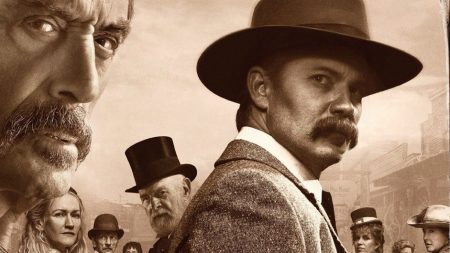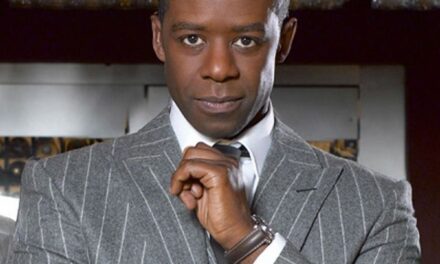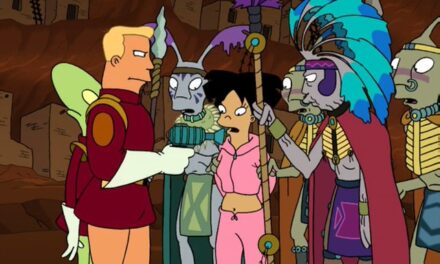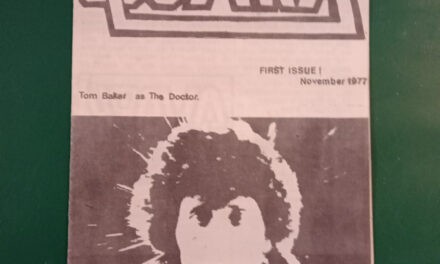 While the networks and streaming services continue to appeal to our cultural obsession with the past—from Watchmen and El Camino to the recent restart of Mad About You—I’m still thinking about that return to Deadwood from last spring, as a test case, perhaps, for all of this televisual nostalgia and its impact on us as viewers. For all of the time that passed between the end of the series and the film (as well as in the narrative itself), not much had changed, as we saw, in Deadwood. Seth Bullock still had a really bad temper, Alma Ellsworth was still hopelessly hooked on him, Al Swearengen still had a heart beating, Grinch-like, beneath his grizzled, booze-soaked exterior, George Hearst still inspired the very worst in the townspeople, and Mr. Wu’s pigs still enjoyed dining out on human flesh. Oh, and the residents still knew how to punctuate their sentences with colorful language, as their substantial assortment of swear words continued to fly faster than bullets and with the rhythm and artistry of a Shakespearean soliloquy. In many ways, being reunited with Deadwood was like slipping back into a comfortable pair of long johns, a metaphor that I may withdraw as I think about Al Swearengen’s disturbing, urine-stained pair at one point in the movie, or swallowing a favorite whiskey shot, one that burned on the way down even as it soothed.
While the networks and streaming services continue to appeal to our cultural obsession with the past—from Watchmen and El Camino to the recent restart of Mad About You—I’m still thinking about that return to Deadwood from last spring, as a test case, perhaps, for all of this televisual nostalgia and its impact on us as viewers. For all of the time that passed between the end of the series and the film (as well as in the narrative itself), not much had changed, as we saw, in Deadwood. Seth Bullock still had a really bad temper, Alma Ellsworth was still hopelessly hooked on him, Al Swearengen still had a heart beating, Grinch-like, beneath his grizzled, booze-soaked exterior, George Hearst still inspired the very worst in the townspeople, and Mr. Wu’s pigs still enjoyed dining out on human flesh. Oh, and the residents still knew how to punctuate their sentences with colorful language, as their substantial assortment of swear words continued to fly faster than bullets and with the rhythm and artistry of a Shakespearean soliloquy. In many ways, being reunited with Deadwood was like slipping back into a comfortable pair of long johns, a metaphor that I may withdraw as I think about Al Swearengen’s disturbing, urine-stained pair at one point in the movie, or swallowing a favorite whiskey shot, one that burned on the way down even as it soothed.
In fact, as much as the film seemed to bring closure to a good portion of the story and tie things up for us as viewers, I felt like I could have watched a few more hours or even another season of it and spent more time in town, to see where progress took the characters and how (or if) they made their way to the twentieth century and to that modern world, complete with working telephones, that awaited them. Would they continue to struggle with the age-old competing claims of morality and desire (and hygiene), and who, specifically, would succeed (or impede) the Swearengens and Bullocks of Deadwood in managing them? Would the Gem Saloon’s transformation to a dance hall be a sign that civilization was on its way, or would it turn out to be a painfully regrettable business decision?
My experience in watching the film, though, is what continues to concern me the most, and that’s what I’d like to focus on for this post. While so much about the movie and the setting was familiar, something significant had changed, and it wasn’t just the actors or the characters, who were clearly older, or the appearance of the town. Deadwood just felt different, and I don’t mean that as a cutting criticism of the film. In a way, I’m impressed that creator David Milch and the actors were able to bring it all back to such great effect. Trixie’s curse-fueled diatribe from her balcony, for example, had all the buckshot of something that you might have heard in the show’s original run.
But that run was more directly about defining justice during a transitional time in history, a highly relevant topic for viewers, as Milch well knew, in those early post-9/11 years. In thinking about the implications of Wild Bill Hickok’s death and the “long game” of history that was being played out, I had this to say in David Lavery’s Reading Deadwood collection:
While [Hickok’s death] is tragic, it further illustrates, within the chaos that is Deadwood, the dangers of living in a society “with no law at all.” History and the future of America itself are at stake at that table in Nuttall and Mann’s (and throughout the muddy camp itself), and Milch, his writers, and his cast and crew make that history matter by daring not to sugarcoat the pill, by daring to show our ancestors, in all of their vicious glory, as they recognize the need for civilized institutions. Inasmuch as the dead help them to learn that lesson (and us to appreciate it), they become necessary sacrifices now laden with historical meaning […]. Jack McCall may have killed him needlessly that day, but, as the series now recasts his death and reconsiders its consequences, for justice to be born in Deadwood, Wild Bill must die. (55-6)
If people were turning to the show to escape the headlines, they oddly found themselves drawn into a narrative that reflected them and into an extended metaphor that spoke, in colloquial cursing, to their anxieties about them. (In this regard, a number of critics have explored that metaphor as a 9/11 statement in detail. Among them, David Drysdale has described the camp as “an analog for the USA and its post-9/11 policies” (134), while Robert Westerfelhaus and Celeste Lacroix have talked about “the series’ ritualistic reworking of the traditional Western [as a reflection of] American angst in the wake of 9/11” (19). ) Deadwood was a meticulously designed microcosm of the American landscape, past and present—something Milch was insightfully aware of in creating the series. “Nothing [on the show],” as he made clear in Deadwood: Stories of the Black Hills, “[was] irrelevant to our contemporary reality” (53), from Bill’s death in Season One to Hearst’s impact on the camp in the second and third seasons.
Though justice was still on the table in the film—consider Bullock’s beating of one of Charlie Utter’s killers or his need to save Hearst from the angry mob as further “rough” attempts to define it—the terms of the game were not the same, just as the world had changed (and continues to change) for us as well. In the aftermath of 9/11, we probably felt, at times, like we were in a place with “no law at all” or that we needed to bring order to the chaos of the world by rethinking what was lawful, and so Deadwood spoke to us. In the film, though, Deadwood was no longer a place without laws or justice; rather, it was a place that was trying to decide just what kind of justice it would subscribe to and support. Would it allow Hearst to manipulate the system and arrest the newly married Trixie for shooting him, or would Hearst himself be brought to justice for his part in Charlie Utter’s murder?
But my focus this time around wasn’t so much on justice or with what the show could be saying about 9/11; it was on George Hearst himself. As the businessman turned politician, Hearst, who repeatedly used his extensive resources to expand his influence in the camp and only added to his laundry list of crimes in doing so, seemed more like a nineteenth-century Trump gone wild last spring, a connection that has only intensified since then with the impeachment inquiry and the heated talk of the president’s abuse of office. In jumping from the headlines to the film, I wondered if Hearst’s beating was literally an attack on Trump or just another brutal example of mob mentality. Since the film moved forward in time from the series, had the commentary/metaphor moved on as well?
I doubt that Milch and his writers were, in an inspired moment of prophecy, thinking of Trump or anticipating his rise to power when they initially crafted the character. In Stories of the Black Hills, Milch referred to Hearst as an “abstraction […], which is symbolized in gold, [and] also at the very heart of what makes us human” (55). Inasmuch as the characters are more archetypes than allusions, what seemed so recognizable to me were more likely basic human traits that continued to persist. Like the series, the film worked on multiple levels and recalled current events because it was based on such foundational attitudes and desires. (As Milch plainly put it, “None of us want to realize that we live in Deadwood, but all of us do. That is the point of the exercise” (213).) And, if those attitudes and desires are the things about us that endure, then perhaps that is what we are really referring to when we talk about history repeating.
What I saw in the film, though, also speaks to our current preoccupation with reboots and revivals. Regardless of how much we may want to go back, to go home, to Will and Grace’s apartment, to Walter White’s New Mexico, to the Conners’ living room, or to anywhere else on television (or in real life, whatever that is), those returns only bring out the differences, the changes that time makes on all of us, the way that circumstances force us to move on in one direction or another, the way that new cultural contexts spark/demand new readings and new interpretations. As much as showrunners like Milch and Gilligan may bring us back to those places and as successfully as they may resurrect them, the shows themselves are always of a moment. They won’t look the same or mean the same things to us; they can’t because those moments and our experience of them will have passed. Looking into our flatscreens (or what creator Charlie Brooker has called our “black mirrors”), we won’t see exactly what we once saw because we won’t be watching from the same place or looking with the same eyes. While Deadwood: The Movie reunited me with that time, those characters, and that camp, riding back into town brought me back, ultimately, to this new world.
Douglas L. Howard is Chair of the English Department on the Ammerman Campus at Suffolk County Community College and co-editor, with David Bianculli, of Television Finales: From Howdy Doody to Girls (Syracuse University Press, 2018).
Works Cited
Drysdale, David. “‘Laws and Every Other Damn Thing’: Authority, Bad Faith, and the Unlikely Success of Deadwood.” Lavery, pp. 133-44.
Howard, Douglas L. “Why Wild Bill Hickok Had to Die.” Lavery, pp. 43-56.
Lavery, David, editor. Reading Deadwood: A Western to Swear By. I.B. Tauris, 2006.
Milch, David. Deadwood: Stories of the Black Hills. Bloomsbury, 2006.
Westerfelhaus, Robert, and Celeste Lacroix. “Waiting for the Barbarians: HBO’s Deadwood as a Post-9/11 Ritual of Disquiet.” Southern Communication Journal, vol. 74, no. 1, 2009, pp. 18-39, doi: 10.1080/10417940802483118.







Fascinating read Douglas – many thanks! 🙂
I’m always rather intrigued by belated continuations or conclusions to series and to see how well they subsequently work. Some of them are like bad assemblies of the half-remembered cliches that have built up around the originals, while others might remain faithful but just play very badly in a world that’s moved on. When a format does return and continue to work as effectively – or even better – some years later, it’s a real punch-the-air moment, and it’s always fascinating to understand what does/doesn’t work and why.
Even as somebody who didn’t get beyond the first episode of “Deadwood” (due simply to having to select from a deluge of fascinating programming on offer), this was very enjoyable. Many thanks! 🙂
All the best
Andrew